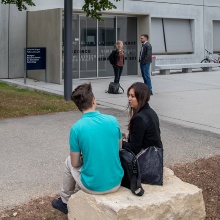Follow-on or continuing education Master's programs
The Bachelor's degree is followed by the Master's degree. These Master's programs are called “consecutive” because they pick up the content and skills gained in the undergraduate Bachelor’s study programs.
In addition, the University of Stuttgart offers continuing education degree programs, which also end with an academic Master’s degree being awarded.
Master's titles and options
Upon successfully completing your Master’s studies, the University of Stuttgart confers an academic title that begins with "Master", depending on the academic field. Aside from that, the academic Master’s titles rank equally.
Like the Bachelor’s, the Master’s degree is an internationally recognized academic degree. Graduates equipped with a Master’s degree have good prospects on the job market, since they have demonstrated the ability to work independently and can bring comprehensive methodological and technical knowledge to the job.
The Master’s degree is also a prerequisite for doctoral degree studies making it the second step in an academic career.
- Master of Arts (M.A.)
-
is awarded in the cultural and social sciences.
- Master of Science (M.Sc.)
-
in the natural sciences, engineering sciences and economics.
- Master of Education (M.Ed.)
-
designates the degree earned in a study program for the position of high school teacher.
- M.BP., M.BE., M.Ac.
-
are titles of the extra-occupational Master’s programs.
Teaching qualification
All information on studying for a teaching degree is published on our teaching degree website.
The basics of Master’s degree studies
One prerequisite for consecutive Master’s study programs is a first degree, which, in most cases, is the Bachelor’s degree. A student in possession of the academic rank of Bachelor's (B.A. oder B.Sc.) awarded by a university in most cases can continue his or her studies in the same or a similar subject toward a Master’s degree (M.A. or M.Sc.) at the University of Stuttgart. Additional criteria, such as the final grade, modules to be evidenced, or knowledge of languages, may apply.
Master's programs are organized in modules. A total of 120 ECTS-Credits must be earned, divided into four semesters of 30 credits each. The Master’s thesis, which accounts for 30 ECTS credits, completes the degree work. For the most part, the fourth semester is set aside for this scientific analysis.
Specific details on which modules are required for each Master’s study program and which lectures, exercises and (major) seminars they cover can be found in the module handbooks.
Further information on modules and ECTS-Credits is published in our glossary, the University A-Z.
A Master’s study program normally lasts four semesters at the University of Stuttgart. In addition to the standard period of study there is also the maximum length of study. It is usually 8 semesters and is laid down in the exam regulations. This means that you generally have up to 8 semesters to complete your Master’s degree.
Key competencies are necessary, for example, in order to acquire new knowledge and skills and to be able to face challenges in your studies and at work as is appropriate.
Master's programs can comprise courses that belong to the field of key competencies (SQ). You must successfully complete the SQ courses related to your discipline, for which the respective study program is responsible, as well as the interdisciplinary SQ courses, which are coordinated by the Center for Higher Education and Lifelong Learning (ZLW). The exam regulations determine which SQ courses you can attend and when.
Extra-occupational Master’s degree programs
The University of Stuttgart also offer extra-occupational Master’s study programs. In contrast to the consecutive Master’s degree, these are of a continuing education nature and are aimed primarily at individuals who already are working. These degrees, like the consecutive Master’s, confer the recognized Master’s title.
Depending on the study program, these are the titles conferred:
- M.B.E. (Master of Business Engineering)
- M.BP. (Master of Building Physics)
- M.Sc. (Master of Science)
The Master’s study programs are fee-based, as required by the German Competition Law. Depending on the program, the costs for the entire study program will total between 13,000 and 22,000 euro. Costs may be paid by the employer under some circumstances. In addition, they may be tax deductible. For more information on financing options, see the pages of the respective study program.
The prerequisites include having completed a Bachelor's program and at least one year of professional experience. The occupation matters on the chosen course of studies: it must be relevant, in other words, being linked to the subject field.
Contact




